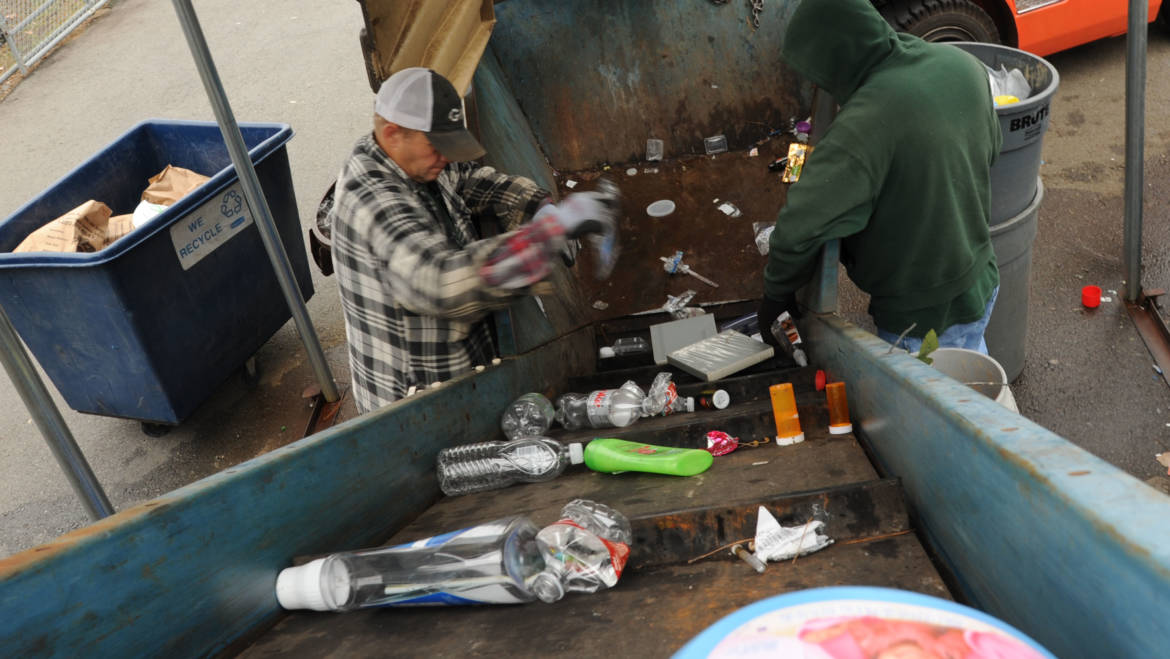Text by Jayani I. Sudusinghe, Felipe A. de Lima, and Biman D. Hettiarachchi.
What happens to the disposable coffee-to-go cup we drink every morning?
What happens to the polythene wrapping of our tasty sandwich?
What happens to the soda can we drink and throw away?
One may say, “Who cares?” The others who are at least a little conscious would say, “Oh, I think they are recycled, but I don’t know how.” But at the end of the day, all of us will throw all these “trash” into the garbage bin.
Are we aware that the recycling of our “trash” doesn’t happen magically? For some people and small businesses, our “trash” is “treasure.” But they put a hard effort to collect and to sort out the “trash” before recycling. The second stage of their work is made really hard by our actions because all the “trash” is mixed. Food (biowaste), polythene, paper, and metals in one single garbage bin.
As a result, “Fewer than half of the bottles bought in 2016 were collected for recycling, and just 7% of those collected were turned into new bottles. Instead most plastic bottles produced end up in landfills or in the ocean.” [1].
This is mainly thanks to our way of seeing “trash” as useless! So, it’s time to change from “trash” to “waste” and what we do with it.
Recycling has become a real nightmare not only because of the mixed waste but also because of the hard work of the collectors. Imagine if you were such a collector, and had to deal with the mixed waste, would you be happy to do its separation every day?
If we are conscious, we will be thus empathetic towards the collectors’ work. Then, we respect their hard work by following proper waste disposal and collection mechanism. This is where the immense role of the supply chain comes in to realize the circularity of waste.
With a proper supply chain, our waste can be sent to a ‘responsible’ somewhere or someone other than the garbage dump. Else, this waste would end up in the landfills or the ocean, damaging the ecosystems of our planet. Importantly, by adopting responsible behavior in waste disposal, we can become a part of this supply chain and, therefore, the “Circular Economy.”
But what if there is no proper mechanism to dispose the waste, and nobody is willing to accept the waste we create? Currently, this is what is mostly happening worldwide. Of course, we could do something with our waste. We can compost it at home or change our consumption patterns to reduce it. For instance, a family in California takes all the measures as a family to reduce the waste created by their consumption [2]. But still, there are limitations to what they could do with the little waste they produce after their tireless efforts. That is why it is essential to understand the role of individuals, companies, and communities who are playing a key role on behalf of all of us by taking care of the waste we create.
So, our garbage will be embraced by a particular company as an input into their system. Similarly, the waste created by this single company can become a resource for many other companies. In a level ahead, the transition of waste to wealth can happen from an industry’s perspective. One industry’s disposal can become a resource for another industry to manufacture products for a low cost in a creative manner leading towards more innovation. This transition from a micro to a macro level develops the Circular Economy [3]. In simple terms, this transition starts with YOU and ME and ends up in an economy.
However, to send our disposal to a company or an industry, there should be a precise mechanism. For instance, Germany practices a robust waste disposal mechanism [4], starting with the diligent waste categorization happening at the household level. This example reflects that individuals like YOU and ME, and institutions like governments and private organizations in different industries as a cohort should work together to solve the waste issue. With a silo mentality, a society cannot initiate and sustain proper waste management in the Circular Economy. Hence, this whole circularity begins with a simple effort from every one of us.
Importantly, the circular flow of waste alone cannot save the world. Hence, like Africa does by rejecting and reducing the use of plastic and polythene [5], we need to minimize our total environmental impact. But first, we should resolve whatever the damage we have done with all the waste we have created by LEARNING from past mistakes and engaging ourselves to improve our PRESENT and future.
Our attempt, through the ReTraCE Project, is a tireless effort to pave the path for sustainable consumption, while assisting the enthusiastic and creative individuals, companies, and industries in finding their way encouraging others to join the cause.
References
[2] https://www.youtube.com/watch?v=67yX1C4gaDA
[3] https://www.sciencedirect.com/science/article/pii/S0959652615012287
[4] https://www.youtube.com/watch?v=I_fUpP-hq3A
[5] https://www.facebook.com/worldeconomicforum/videos/2497723753615616/
Authors’ information
Jayani holds a Master’s Degree in Supply Chain Management from the University of Moratuwa, Sri Lanka. She also worked as an Instructor and a visiting lecturer in the Department of Transport and Logistics, University of Moratuwa Sri Lanka, teaching Sustainable Supply Chain Management. She is an ESR and Ph.D. candidate at the University of Kassel, Germany.
Felipe holds a Master’s Degree in Business Administration from the University of Fortaleza, Brazil, with a focus on the dynamics of food production, marketing, and consumption in Alternative Food Networks (AFNs) located in the Brazilian Semiarid region. He is an ESR and Ph.D. candidate at the University of Kassel, Germany.
Biman holds a Master’s Degree in Computer Science and a Bachelor’s Degree in Transport and Logistics Management from the University of Moratuwa, Sri Lanka. He is a Research Assistant and Ph.D. candidate at the University of Kassel, Germany.

